
Pigeons to be banished for threatening tourists in Spanish town of Cadiz

Cadiz Cathedral in Spain is facing a pigeon infestation.
Laura Perez Maestro, CNN • Updated 13th December 2018
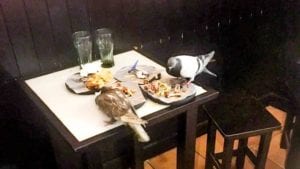
Brazen Pigeons feeding directly from the table.
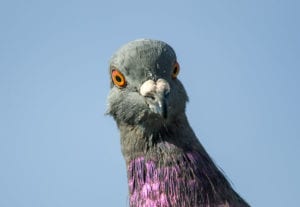
Health risks


Cadiz Cathedral in Spain is facing a pigeon infestation.
Laura Perez Maestro, CNN • Updated 13th December 2018

Brazen Pigeons feeding directly from the table.



By Karoline Kan, CNN • 6th April 2019
Every day during the racing season, 55-year-old Zhang Yajun wakes at 4 a.m. and carefully loads bamboo cages containing his 76 cherished racing pigeons into a van. Then he drives up to 200 kilometers (124 miles) from his Beijing apartment to release them. They are in training for the October and November racing season, during which time millions of dollars can be won in total prize money across races.
And then there is the cheating.
In April last year, two men hid their birds in milk cartons and caught a bullet train in Henan before releasing them in Shanghai, 750 km (466 miles) away. But the birds’ unusually fast speed aroused suspicion, and the men were fined and given suspended three-year prison sentences for fraudulently obtaining prize money totaling about $147,000.
However; Beijing is becoming less and less friendly to bird fanciers.
About Pigeon Patrol:
Pigeon Patrol Products & Services is the leading manufacturer and distributor of bird deterrent (control) products in Canada. Pigeon Patrol products have solved pest bird problems in industrial, commercial, and residential settings since 2000, by using safe and humane bird deterrents with only bird and animal friendly solutions. At Pigeon Patrol, we manufacture and offer a variety of bird deterrents, ranging from Ultra-flex Bird Spikes with UV protection, Bird Netting, 4-S Gel and the best Ultrasonic and audible sound devices on the market today.
Contact us at 1- 877– 4– NO-BIRD, (604) 585-9279 or visit our website at www.pigeonpatrol.ca


Phil Mailloux fires a noise maker in the air at the Windsor Airport in Windsor on Friday, September 21, 2012. Mailoux is part of the team that keeps the airport free of potentially deadly pests. (TYLER BROWNBRIDGE / The Windsor Star)
To discover a vast varmint-free oasis in this city, go no further than the Windsor International Airport. It’s legal to hunt, trap, chase, haze and harass any bird or animal that shows its unwanted face within YQG’s 2,000 acres of fenced-off territory.
Trap cages containing pigeons as live lures are just one of the devices deployed to keep down the numbers of raptors, including American kestrels, red-tailed and Cooper’s hawks, snowy and great-horned owls and even peregrine falcons. Such birds are kept in cages for 24 hours and then transported elsewhere, including Holiday Beach.
Chicken wire edging and even glued-on golf tees keep birds off landing lights and other runway fixtures. Airfield directional signs are now encased in gravel piles to keep skunks from digging down and creating nesting burrows.
“We use the biology of the critter to let them know this is not a safe place to be,” said Roberts. Wildlife control trucks that can be quickly deployed come equipped with noise-making sirens and distress callers, and staff have firearms and an array of “pyrotech” devices at the ready, including bangers and screamers and screeching “wizards.”
Have a Pigeon Problem?
Pigeon Patrol Products & Services is the leading manufacturer and distributor of bird deterrent (control) products in Canada. Pigeon Patrol products have solved pest bird problems in industrial, commercial, and residential settings since 2000, by using safe and humane bird deterrents with only bird and animal friendly solutions. At Pigeon Patrol, we manufacture and offer a variety of bird deterrents, ranging from Ultra-flex Bird Spikes with UV protection, Bird Netting, 4-S Gel and the best Ultrasonic and audible sound devices on the market today.
Voted Best Canadian wholesaler for Bird Deterrent products eight years in a row.
Contact us at 1- 877– 4– NO-BIRD, (604) 585-9279, or visit our website at www.pigeonpatrol.ca
4-S Gel Bird repellent, Animal Deterrent Products, Bird Deterrent Products, Bird Netting, Pigeon Patrol’s Services, Pigeon Spikes, Pigeons in the News, UltraSonic Bird Control, Bird spikes, Bird Gone, Pigeon Gone, Pigeon problems, pigeon spikes, 1-877-4NO-BIRD, 4-S Gel, Bird Control, Pigeon Control, bird repellent, Bird Spikes, sonic bird repellent, stainless steel bird spikes, bird spikes Vancouver, Ultra Sonic Bird Control, Bird Netting, Plastic Bird Spikes, Canada bird spike deterrents, Pigeon Pests, B Gone Pigeon, Pigeon Patrol, pest controller, pest control operator, pest control technician, Pigeon Control Products, humane pigeon spikes, pigeon deterrents, pigeon traps, Pigeon repellents, Sound & Laser Deterrents, wildlife control, raccoon, skunk, squirrel deterrent, De-Fence Spikes, Dragons Den.
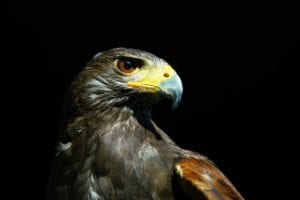

WIMBLEDON, England — Imagine the fluttering kerfuffle.
Roger Federer is serving for the Wimbledon title. He tosses the ball and cranes his neck.
Plop. A gift from a pigeon, right on the forehead.
Luckily, something like that hasn’t happened. At least not yet, not during a big match in recent memory.
For that, Wimbledon can thank a brown and chestnut bird of prey with keen eyes, a four-foot wingspan and bone-crushing talons. His name is Rufus the Hawk, and he plays a crucial role at the world’s oldest tennis tournament.
Every day, in the early morning, well before the matches begin, Rufus soars the skies over the All England Club, on the prowl for pigeons.
Without him, Wimbledon just might descend into aviary chaos. Pigeons could reign supreme, not just in the air, but also in the rafters, on the rooftops and across the grass courts.
The place is perfect for pigeons. “All of the grass seeds, all of the nooks and crannies, and the food waste from the fans,” Wayne Davis, one of Rufus’s handlers, said. Without Rufus, he reckoned, pigeons would number in the hundreds.
Wayne Davis, one of Rufus’s handlers, with a younger companion of the hawk. “Feral pigeons breed year round,” he said. “If you have just one pair breeding in the rafters at Centre Court, you would end up by the end of the year with about 40 more birds. You could have Roger Federer serving and clouds of pigeons wafting about.
“And pigeon poop, too, of course.”
Flocks of pigeons became a growing problem in the late 1990s, a threat to the prim fastidiousness that Wimbledon prizes above all. That was when the All England Club telephoned Davis and his family-run Avian Environmental Consultants.
Another of their birds was the first to patrol Wimbledon. Then Rufus the Hawk took over. He has become an English icon.
From dawn to dusk, he soars, on the prowl for pigeons. He doesn’t kill them. He toys with them, barreling from above, twisting, turning, squawking and nipping at their wings, announcing to all that the skies over Wimbledon belong to him.
“The pigeons learned he was in charge,” Davis said. “Other than a few stragglers, they stopped coming around like they did before. He scares them away.”
Rufus would have been a fearsome predator in the wild. Although he weighs just 1 pound 6 ounces, he cuts a much larger figure with his confident bearing and cascade of feathers.
He can spread his talons almost as wide as a person’s hand, and he can see 10 times better than any human. He can focus on a pigeon from a mile way.
Davis and his daughter, Imogen, feed him by hand because his weight is important. At less than a pound and a half, he can become too hungry and might have a pigeon for lunch. Maybe in front of the royal box.
They have taught him to come when they whistle.
Most often, he does.
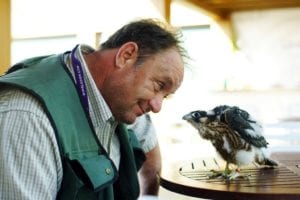
Rufus soars and (almost) always comes back.
On one occasion three years ago, however, Imogen Davis had to chase him down at a nearby golf course. He took off again, across a road, then out of sight. She followed the jingle of his small bronze bell, attached to a talon.
She found him in the middle of a pond, standing in a thicket of weeds, hovering over a freshly killed duck. She couldn’t let him eat it. A full tummy would mean he wouldn’t come home until he was hungry again.
She waded through muck and lily pads, then through waist-high water. When she trooped back to Wimbledon, past crowds lined up to watch tennis in their finery, she had Rufus in her clutches.
One time, he vanished overnight.
Wayne Davis had left the bird in the family camper, parked outside an apartment they stay at during tournaments. Davis tucked him into the black cage that is his bedroom, and cracked a camper window just enough for ventilation. In the morning, Rufus and his cage were gone.
Someone had broken in and stolen him.
“My heart sank,” Imogen Davis said. She, her parents and her siblings had bought Rufus from a breeder when he was 16 weeks old, and he had become a member of the family.
“It was terrible,” she said. “There were a lot of tears.”
By then, Rufus had celebrity status, even a Twitter handle. The theft of Rufus the Hawk became headline news.
“Game, set and snatched,” wrote The Daily Mail.
The police said to expect someone to be in touch, demanding a ransom.
Three days went by. Then, from a phone booth, someone telephoned the Royal Society for the Prevention of Cruelty to Animals. No one knows for sure what had transpired — maybe Rufus had gotten away from the birdnappers, or maybe they decided to simply give him up — but he had been spotted in a park.
Imogen Davis, another handler, said Rufus once stayed in the Centre Court rafters overnight. The animal welfare charity picked him up. Rufus went back to work. He hasn’t missed a day since.
Imogen Davis said Rufus has taught her important lessons. Like the morning he flew into the Centre Court rafters and decided to stay there.
Two hours passed. Then five. Then 10. He still wouldn’t budge. “Luckily it wasn’t during the actual tournament,” she said, a nod to the fact that Rufus polices Wimbledon year round. She and her mother, Donna, wrapped themselves in towels and spent the night on Centre Court.
“We didn’t sleep in the royal box,” Imogen Davis said. “We didn’t sleep at all.”
The next day, Rufus came down.
The lesson was a lot like Zen: Rufus never gets ruffled. He does things in his own good time.
Has he ever, in his own good time, decided to perch in the Center Court rafters during a match?
No, Davis said. She chuckled. “But if he did, he would just stay perched up there, saying, ‘I don’t know who Roger Federer is.’”
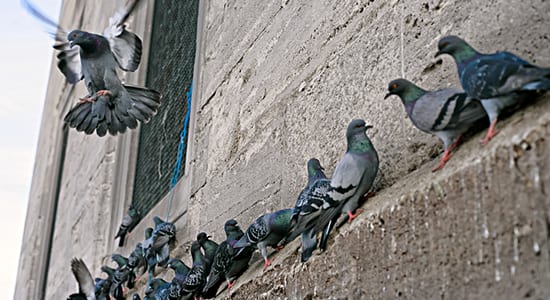
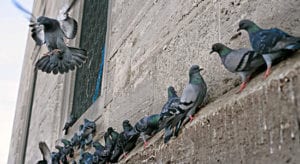
Business owners in La Crosse are putting pigeons on birth control – sort of.
Feeding stations atop downtown buildings include a contraceptive feed. It’s aimed at lowering reproduction in the birds that leave droppings on sidewalks, awnings and park benches.
Wayne Oliver, a member of the Downtown Mainstreet Board, tells WXOW that it’s the most successful idea the board has tried.
Maria Norberg, owner of a downtown coffee shop and food truck, says she supports anything that can cut down on the overhead threat to her customers.
Funding comes from a city beautification grant.
Here at Pigeon Patrol, we manufacture, sell, and install bird exclusion products, such as bird spikes and netting. Visit our website for the latest in humane bird control products and services.
Bird spikes, Bird Gone, Pigeon Gone, Pigeon problems, pigeon spikes, 1-877-4NO-BIRD, 4-S Gel, Bird Control, Pigeon Control, bird repellent, Bird Spikes, sonic bird repellent, stainless steel bird spikes, bird spikes Vancouver, Ultra Sonic Bird Control, Bird Netting, Plastic Bird Spikes, Canada bird spike deterrents, Pigeon Pests, B Gone Pigeon, Pigeon Patrol, pest controller, pest control operator, pest control technician, Pigeon Control Products, humane pigeon spikes, pigeon deterrents, pigeon traps, Pigeon repellents, Sound & Laser Deterrents, wildlife control, raccoon, skunk, squirrel deterrent, De-Fence Spikes, Dragons Den.